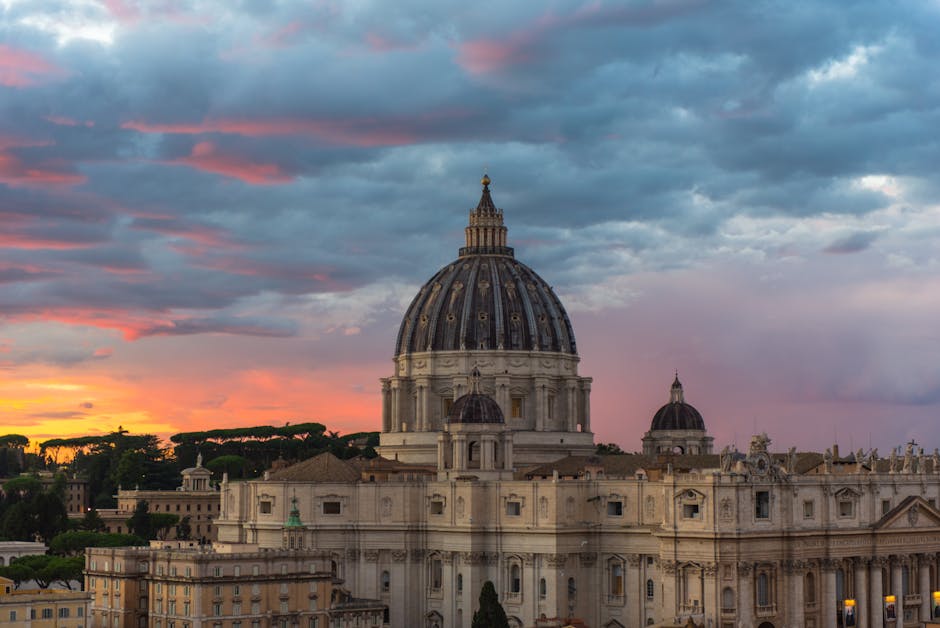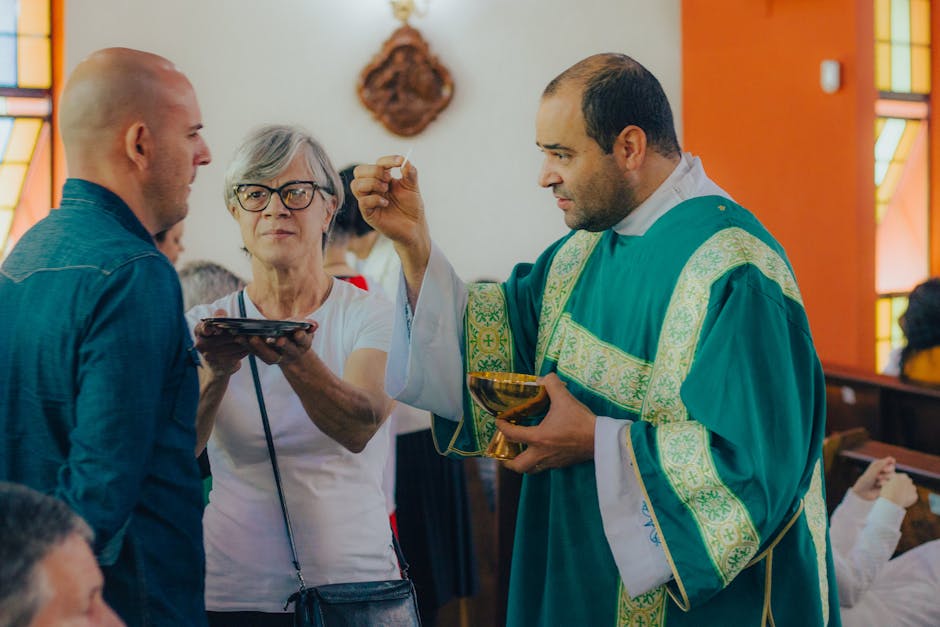Catholicism is one of the oldest Christian traditions in the world, with roots tracing back to Jesus Christ himself and his apostles. The word “Catholic” comes from the Greek word “katholikos,” meaning “universal” or “according to the whole.” Today, with approximately 1.3 billion followers worldwide, the Catholic Church represents the largest Christian denomination globally.
As Pope Francis reminds us, “Being a Christian isn’t just following commandments: it’s letting Christ take possession of our lives and transform them” (General Audience, June 2013). This guide aims to outline the fundamental aspects of Catholic faith and practice, providing insight into what it means to be Catholic in today’s world.
Foundations of Catholic Faith
The Nicene Creed
The Nicene Creed, formulated in 325 AD and refined in 381 AD, remains a foundational statement of Catholic belief:
“I believe in one God, the Father almighty, maker of heaven and earth, of all things visible and invisible. I believe in one Lord Jesus Christ, the Only Begotten Son of God…”
This creed summarizes essential Catholic beliefs about God, Jesus Christ, the Holy Spirit, and the Church.
Sacred Scripture and Sacred Tradition
Catholics recognize two sources of divine revelation:
- Sacred Scripture (The Bible): Catholics embrace the Bible as the inspired Word of God. As St. Jerome famously stated, “Ignorance of Scripture is ignorance of Christ.” The Catholic Bible includes 73 books (46 in the Old Testament and 27 in the New Testament).
- Sacred Tradition: Unlike some Christian denominations, Catholics do not believe in “Scripture alone” (sola scriptura). Instead, they recognize the importance of apostolic tradition. In 2 Thessalonians 2:15, St. Paul urges believers to “stand firm and hold fast to the traditions that you were taught, whether by word of mouth or by letter.”
The Sacraments
Catholicism is distinctively sacramental. The seven sacraments are visible signs instituted by Christ to give grace:
- Baptism: The gateway to Christian life, removing original sin and making one a member of the Church. “Go therefore and make disciples of all nations, baptizing them in the name of the Father and of the Son and of the Holy Spirit” (Matthew 28:19).
- Confirmation: Completing the grace of Baptism through a special outpouring of the Holy Spirit. “And they were all filled with the Holy Spirit…” (Acts 2:4).
- Eucharist: The “source and summit” of Christian life, in which bread and wine become the Body and Blood of Christ. “This is my body, which is given for you. Do this in remembrance of me” (Luke 22:19).
- Reconciliation (Confession): Forgiving sins committed after Baptism. “If you forgive the sins of any, they are forgiven them; if you retain the sins of any, they are retained” (John 20:23).
- Anointing of the Sick: Conferring a special grace on those suffering from illness. “Is anyone among you sick? Let them call the elders of the church to pray over them and anoint them with oil in the name of the Lord” (James 5:14).
- Holy Orders: Conferring the sacred power of ministry. “I remind you to rekindle the gift of God that is within you through the laying on of my hands” (2 Timothy 1:6).
- Matrimony: Uniting a man and woman in an indissoluble bond. “What God has joined together, let no one separate” (Mark 10:9).
The Magisterium: Church Authority
Catholics believe that Christ entrusted his teaching authority to the apostles, which continues today through the pope and bishops in communion with him.
Jesus said to Peter: “You are Peter, and on this rock I will build my church… I will give you the keys of the kingdom of heaven, and whatever you bind on earth will be bound in heaven, and whatever you loose on earth will be loosed in heaven” (Matthew 16:18-19).
The Magisterium (teaching office) of the Church interprets Scripture and Tradition. As the Second Vatican Council’s document Dei Verbum states: “The task of authentically interpreting the word of God, whether written or handed on, has been entrusted exclusively to the living teaching office of the Church.”
Catholic Moral Teaching
Catholic moral teaching is rooted in the dignity of the human person created in God’s image. It encompasses:
- The Ten Commandments (Exodus 20:1-17) and Jesus’ Great Commandment: “You shall love the Lord your God with all your heart, and with all your soul, and with all your mind… And you shall love your neighbor as yourself” (Matthew 22:37-39).
- The Beatitudes (Matthew 5:3-12), which outline the path to true happiness.
- Catholic Social Teaching, which addresses issues like human dignity, solidarity, subsidiarity, and care for creation. Pope Leo XIII’s 1891 encyclical Rerum Novarum began the modern development of this teaching, which continues through documents like Pope Francis’ Laudato Si’.
As St. John Paul II wrote in Veritatis Splendor (1993): “The moral life is a response to the many gratuitous initiatives taken by God out of love for humanity.”
Prayer and Devotional Life
Prayer is vital to Catholic life. Jesus taught, “When you pray, go into your room and shut the door and pray to your Father who is in secret” (Matthew 6:6).
Common Catholic prayers include:
- The Lord’s Prayer (Our Father)
- The Hail Mary, honoring Christ’s mother
- The Rosary, a meditative prayer on the life of Christ
- The Liturgy of the Hours, the official prayer of the Church
Catholics also practice devotions to saints, who serve as models of Christian life and intercessors. As the Catechism states: “The witnesses who have preceded us into the kingdom, especially those whom the Church recognizes as saints, share in the living tradition of prayer” (CCC 2683).
The Mass: Center of Catholic Life
For Catholics, the Sunday Mass obligation fulfills the Third Commandment to keep holy the Sabbath. The Mass consists of:
- Liturgy of the Word: Scripture readings, homily, profession of faith, and prayers
- Liturgy of the Eucharist: preparation of gifts, consecration, and Communion
As St. John Paul II wrote in Dies Domini (1998): “The Sunday celebration of the Lord’s Day and his Eucharist is at the heart of the Church’s life.”
The Liturgical Year
The Catholic liturgical calendar follows Christ’s life:
- Advent: Four weeks of preparation before Christmas
- Christmas: Celebrating Christ’s birth
- Ordinary Time (first part)
- Lent: Forty days of prayer, fasting, and almsgiving before Easter
- Easter Triduum: Holy Thursday, Good Friday, and Easter
- Easter Season: Fifty days celebrating Christ’s resurrection
- Ordinary Time (second part)
Each season has its own colors, prayers, and traditions, creating a rhythm of Christian life.
Living as a Catholic Today
As Pope Benedict XVI noted, “Being Christian is not the result of an ethical choice or a lofty idea, but the encounter with an event, a person, which gives life a new horizon and a decisive direction” (Deus Caritas Est, 2005).
Practical ways to live the Catholic faith include:
- Regular participation in Mass and the sacraments
- Daily prayer and scripture reading
- Ongoing formation in the faith
- Works of charity and social justice
- Evangelization through word and deed
St. Teresa of Calcutta (Mother Teresa) embodied this integration of faith and action: “Not all of us can do great things. But we can do small things with great love.”
Challenges and Misconceptions
Catholics today face various challenges, including secularism, relativism, and misunderstanding of Church teachings. Pope Francis reminds us: “The Church must be a place of mercy freely given, where everyone can feel welcomed, loved, forgiven, and encouraged to live the good life of the Gospel” (Evangelii Gaudium, 2013).
Common misconceptions include:
- Catholics worship Mary and saints (they honor them and ask for their intercession)
- The Church opposes science (it has historically supported scientific inquiry)
- Catholic teachings are arbitrary rules (they are based on natural law and divine revelation)
Conclusion
Being Catholic involves a holistic way of life—integrating faith, worship, moral conduct, and service to others. It means belonging to a universal community that spans time and place, united by common beliefs, practices, and love for Christ.
As St. Augustine wrote: “You have made us for yourself, O Lord, and our hearts are restless until they rest in you.” The Catholic journey is ultimately about this relationship with God, lived in community with others and expressed through love.
In the words of Pope Francis: “Faith is not a light which scatters all our darkness, but a lamp which guides our steps in the night and suffices for the journey” (Lumen Fidei, 2013).
“Go therefore and make disciples of all nations, baptizing them in the name of the Father and of the Son and of the Holy Spirit, and teaching them to obey everything that I have commanded you. And remember, I am with you always, to the end of the age.” (Matthew 28:19-20)




